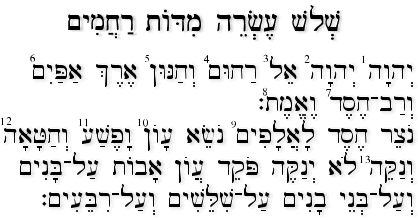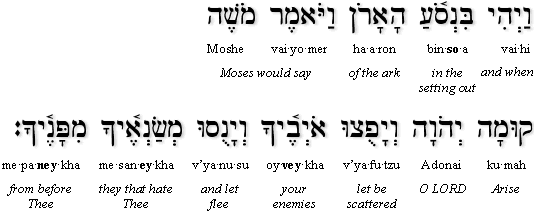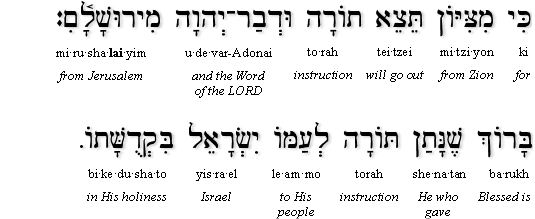|
And it came to pass, when the ark set forward, that Moses said, Rise up, LORD, and let thine enemies be scattered; and let them that hate thee flee before thee (Numbers 10:35).
For out of Zion shall go forth the law, and the word of the LORD from Jerusalem (Isaiah 2:3).
Blessed is He Who gave the Torah to His people Israel in His holiness.
|
|
|
"The LORD, the LORD, a God merciful and gracious, slow to anger, and abounding in steadfast love and faithfulness, keeping steadfast love for thousands, forgiving iniquity and transgression and sin, but who will by no means clear the guilty, visiting the iniquity of the fathers on the children and the children's children, to the third and the fourth generation"
(Exod. 34:6-7)
According to various traditional interpretations, these thirteen attributes of God's Name may be understood as follows:
- Adonai (יהוה) - I, the LORD, am the Compassionate Source of all of life and Ground of all being; I am the breath of life for all of creation. I am the God of all possible worlds and Master of the universe. Everything that exists is an expression of my loving will and kindness: עוֹלָם חֶסֶד יִבָּנֶה / olam chesed yibaneh: "The world is built with chesed" (Psalm 89:3[h]). Since the relative difference between existence and non-existence is infinite, God's creation represents infinite kindness, and since you exist, you likewise are expression of God's kindness and love. You do not exist because God needs you but soley because your life is willed by God as an expression of His love.
- Adonai (יהוה) - Though the LORD created the universe "very good" (טוֹב מְאד), He remained the Compassionate Source of life even after mankind sinned, and therefore the Name is repeated to refer to His loving relationship with alienated, fallen creation. I, the LORD, am also compassionate to one who has sinned and repented (i.e., the Creator gives us free will and the good gift of teshuvah). God created mankind for the sake of teshuvah - that is, our return to Him. God desires atonement with mankind even after sin and therefore continues to give existence to the world. "He makes his sun rise on the evil and on the good, and sends rain on the just and on the unjust" (Matt. 5:45). Moreover, as the Savior and Redeemer of the world through Yeshua, the LORD reveals kindness even to the evil, and even partakes of its presence by means of His sacrificial love on the cross. Since teshuvah can only exist after the advent of sin, Yeshua is called the Lamb slain from the foundation of the world (Rev. 13:8; Eph. 1:4; 1 Pet. 1:20).
In this connection, it should be noted that while God "wills" evil (in the sense of allowing the actions of the wicked to occur), he does not desire it. The sages note that while the Creator supports the existence of both the wicked and the righteous, he loves the righteous, and only their actions are desired by Him (Psalm 1:6). God wills the brokenness of the sinner so that the soul can return to Him by experiencing His salvation, love, and blessing.
- El (אֵל) - I, the LORD, am God the Almighty and Omnipotent;
- Rachum (רַחוּם) - I, the LORD, am merciful (rachamim (רַחֲמִים) means "mercy" and rechem (רֶחֶם) means "womb");
- Chanun (חַנּוּן) - I, the LORD, am gracious; I pour out my favor freely to all of creation. (Chen (חֵן) is the word for "grace");
- Erekh Apayim (אֶרֶךְ אַפַּיִם) - I, the LORD, am slow to anger and patient (the word erekh means "long" and af (אַף) means "nose." The idiom erekh apayim means "long suffering, patient");
- Rav Chesed (רַב־חֶסֶד) - I, the LORD, am abundant in love (חֶסֶד) to both the righteous and the wicked;
- Rav Emet (רַב־אֱמֶת) - I, the LORD, am truthful and faithful in carrying out promises;
- Notzer Chesed La'alafim (נצֵר חֶסֶד לָאֲלָפִים) - I, the LORD, retain chesed (love) for thousands of generations, taking into account the merit of our worthy ancestors (called zechut avot);
- Nosei Avon (נשֵׂא עָוֹן) - I, the LORD, forgive iniquity (avon), defined in the tradition as wrongful deeds committed with premeditation; I "carry iniquity away" (nasa) for the penitent;
- Nosei Pesha (נשֵׂא פֶשַׁע) - I, the LORD, forgive transgression (pesha), defined as wrongful deeds committed in a rebellious spirit;
- Nosei Chata'ah (נשֵׂא חַטָּאָה) - I, the LORD, forgive sin (chet), defined as those wrongful deeds that were inadvertently committed;
- Nakkeh (נַקֶּה) - I, the LORD, will not cancel punishment, but I will clear the guilt for those who genuinely return to Me in teshuvah.
The Shelosh Esrei Middot formula is recited on Yom Kippur, and also during the Torah service on the High Holy Days, Pesach, Shavuot, and Sukkot.
|
|



